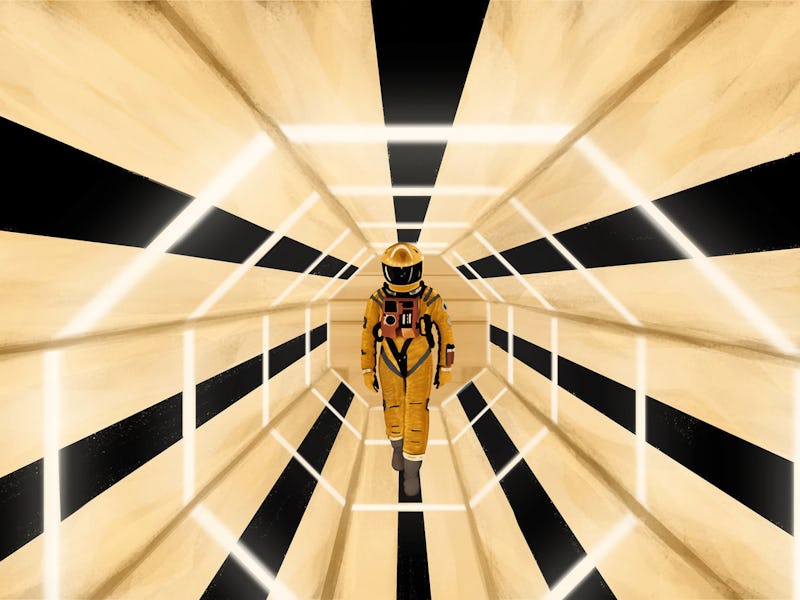President Trump Will Lead to Darker, Defiant Science Fiction
"People will need it more."

There are undoubtedly some science fiction writers who voted for Donald Trump. But given the genre’s historic purpose and political leanings, it’s safe to say that any science fiction writers who supported the president-elect last week are outliers and perhaps even black sheep. And as the Trump presidency approaches, most science fiction writers are preparing to respond to a changed America — though, should the fears they have about what the next four years might look like come true, they’ll have to readjust their traditional approach to their work.
“I feel like a straightforward science fiction that relies on some idea of the rational future and linear progression and forward motion is no longer possible, or at least no longer interesting,” science fiction author Desirina Boskovich told Inverse. In Boskovich’s 2009 short story “Celedon,” the careless crimes of space colonists come back to haunt future generations on planet, which is exactly the kind of future-thinking allegory which seems even more relevant now than ever.
Though it’s a short story, it’s works like “Celedon” that provide some clue about how authors might respond to the country’s new direction. The challenge facing science fiction writers is how to employ the allegorical power of the genre, without simply descending into escapism.
“I couldn’t help but feeling more serious,” Austin Grossman told Inverse about his immediate reaction to the news of Trump’s victory. “Being more serious doesn’t make things necessarily less funny or less enjoyable, but it changes the stakes. If people aren’t safe, it’s not a game any more, and that awareness is seeping into everything I’m doing now.”
Grossman is the author of three novels, which run the gamut of science fiction and fantasy: Soon I Will Be Invincible, You, and Crooked. From superheroes in a sci-fi setting (Invincible) to a video-game-come to life (You), Grossman’s fiction often trades in subverting genre norms by having fun. And this isn’t the first time he’s had to check his fictional work against distressing events in the real world.
“I ran into something similar way back in 2001,” Grossman said. “When I started writing Soon I Will Be Invincible shortly after 9/11, I was immediately stuck with the question: How is a supervillain different from a terrorist?” He explained that though he initially imagined the novel as being grittily realistic, in reaction to the dour political mood, he went upbeat. “The book became both more personal and more comedic,” he said.
The community of science fiction writing has always been supported not just by its readers and writers, but also by visionary editors. Patrick Nielsen Hayden, a senior editor at Tor Books, is amongst the most prominent. On his person blog, Making Light, Nielsen Hayden collected the reactions of science fiction authors in the days following Trump’s election victory. Monica Hesse, author of virtual reality-focused novel Stray, bemoaned the fact that people did not see Trump’s election coming. “Where have you been?” she wrote. “What do you mean you don’t know this America? Why haven’t you seen it? I’ve seen it. I see it all the time.
Science fiction could be categorized as predictive fiction, but sci-fi stories which deal with the future are more than just glorified crystal balls with plots and characters. Science fiction provides a thinking culture with what the critic John Freeman called “a counter mythology.” This means that the science fiction novels and books in the coming years must — and probably will — run against the ruling politics.
“Science fiction originally came into being in response to a new thing in human history,” Patrick Nielsen Hayden said. “It was the new understanding that not only was the world changing, but also that the rate of change was speeding up. … Science fiction at its best has always been about examining and inhabiting those experiences when the world passes through a one-way door.”
This means that the genre isn’t limited to thought experiments about robots, or dreams of owning a laser gun. Instead, the best science fiction trains our minds differently, allowing us to think outside of current constraints. This, in the years ahead, will be not only invaluable, but will serve as intellectual salvation.
“I don’t want to argue that reading science fiction makes us smarter or morally better,” Nielsen Hayden said. “I personally believe that, but I don’t want to argue it. But I do believe that good storytelling is a positive force in the world. And I really do believe that science fiction and fantasy storytelling makes us, in some fundamental way, a bit more practiced in the ways of a world caught up in wrenching change — and more open to imagining better worlds that might be possible.”
Detail of Julie Dillon art for CLARKESWORLD #106 featuring Sam J. Miller
Despite frustrations, clever rising sci-fi star Sam J. Miller shares that sentiment. “What will change, I think, is how people respond to science fiction,” Miller told Inverse. “The future of science fiction in Trump’s America is that people will need it more. As the world grows darker and stranger, we will need dark and strange stories. … To help us hope and imagine better worlds and wondrous technologies, yes, but also to help us grieve, and understand, and grow stronger, and fight back.”